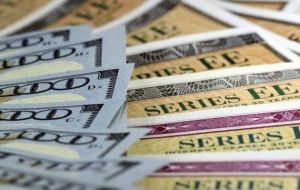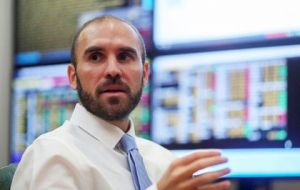MercoPress. South Atlantic News Agency
Lack of confidence, Argentine government main challenge in its first year
 But weakness in the peso has drained foreign reserves, while the central bank was forced into printing money to bolster the pandemic-hit economy
But weakness in the peso has drained foreign reserves, while the central bank was forced into printing money to bolster the pandemic-hit economy  Argentina's risk index dropped sharply after restructuring, but borrowing costs remains sky-high. Argentine bond prices also remain in default territory.
Argentina's risk index dropped sharply after restructuring, but borrowing costs remains sky-high. Argentine bond prices also remain in default territory.  “The restructuring was a necessary condition to resolve Argentina's macro-economic problems,” Finance minister Martin Guzman said
“The restructuring was a necessary condition to resolve Argentina's macro-economic problems,” Finance minister Martin Guzman said Argentina's current government has had a wild ride in its first year of government: a sovereign default, huge debt restructurings together with sliding reserves, a currency crisis, a weak economy battered by COVID-19, and massive money printing.
There have been wins and losses since taking office in December last year. Debt deals were struck that allowed the government to revamp some US 65bn in foreign currency bonds and push repayments well into the future. Talks with the International Monetary Fund remain positive for the restructuring of a US$ 44bn loan extended to the previous government in 2018.
But weakness in the peso has drained foreign reserves, while the central bank was forced into printing money to bolster the pandemic-hit economy. Exports have been sluggish amid devaluation fears, and lack of domestic and international confidence.
Some investors warn that issues reviving growth could lead to another default before long. The country's risk index dropped sharply after restructuring, but borrowing costs remains sky-high. Argentine bond prices also remain in default territory.
“The restructuring was a necessary condition to resolve Argentina's macro-economic problems,” Finance minister Martin Guzman said in an interview last week. “Economic recovery is a necessary condition for stability.”
Guzman forecasts an exit from recession in the first half of next year, but the economic recovery has been far from simple, hit hard by the coronavirus pandemic. The economy is expected to contract some 11-12% this year and poverty has climbed to almost half the population, with many foreign companies abandoning the country.
The pandemic has helped bring down inflation, though it remains at nearly 40% on an annual basis and is expected to make a comeback as consumption recovers and as savings are released into the real economy.
Camilo Tiscornia at consultancy C&T Asesores Económica said monetary issuance to mitigate the impact of the virus, wage hikes and fewer prize freezes would revive inflation. “It is very difficult to think that next year's inflation will end lower than this year,” he said.
The peso has been at the heart of the country's turbulent ride. It crashed sharply mid-last year, causing a rush to the safe haven of dollars. The government imposed tough currency controls, which have been tightened this year.
With tightly limited access to dollars, people flocked to alternative and black markets, willing to pay a steep premium to access greenbacks - driving a wide gap with the official rate.
The central bank, which had shelled out funds to prop up the peso and to fund government spending, moved in recent months to ease fears about its dwindling reserves, which some banks and analysts estimate is around zero in net terms.
Argentina is now in crunch talks with the IMF for a deal to restore confidence in its markets. The two are trying to craft a better relationship and write-over an acrimonious history.




Top Comments
Disclaimer & comment rulesCommenting for this story is now closed.
If you have a Facebook account, become a fan and comment on our Facebook Page!